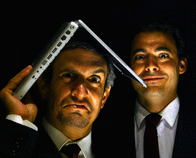Just Say Yes!
The Ruminator interview with anti-corporate pranksters and activists The Yes Men

The Yes Men, headed by Andy Bichlbaum, Mike Bonanno, and Bob Spunkmeyer, are behind a number of pranks that have embarassed news outlets, the World Trade Organization, McDonald’s, the George W. Bush presidential campaign, and industrial giants like Dow Chemical. For the last three years, Andy and Mike have been traveling the world giving outrageous lectures and proposals about free trade, the WTO, and multinational corporations to lawyers, industry leaders, and political leaders around the world. And they’ve done it by passing themselves off as representatives of the WTO; or by posing as Republican campaign workers; or by impersonating a spokesman for Dow Chemical. They’ve been quoted in newspapers, interviewed on CNBC and the BBC, and have appeared as featured speakers at a number of big industry conferences and free trade policy meetings around the world. In 2004, a book and film were released documenting the Yes Men’s exploits; the DVD of the movie is out in February.
Ruminator spoke with the Yes Men’s Bob Spunkmeyer about the controversy surrounding some of the tactics and the unintended consequences of their impersonations, about the state of progressive activism, and what the group hopes to achieve .
SUSANNAH MCNEELY: It’s a pleasure to talk with you. I get the sense that you have quite a pivotal role in the Yes Men, but I’m not quite clear what it is. What do you do for the group? You’re listed as an author of the new book, I suppose you must have some hand in the planning and execution of the hijinks. . .
BOB SPUNKMEYER: I’m really just a behind-the-scenes character. As you’ve probably noticed from the book, I don’t actually do the hijinks. I help more with the conceptualization, planning and some of the writing.
SM: You’ve been an involved activist for progressive causes for much of your adult life (in gay rights, in South America, the Balkans). Has your other activist experience informed your activities and tactics for the Yes Men?
BS: Well, yes, of course. I suppose I’ve been able to help the others think through some of the consequences. But that’s the thing about what the Yes Men do—you can’t afford to think the consequences through too much. If you did, you’d never actually do anything.
SM: In the beginning, the Yes Men’s pranks seem to involve primarily exaggeration and parody of existing corporate or business rhetoric. Then, there was a tactical shift: pretending to be spokesmen for Dow Chemical, you guys went so far as to announce $12 billion in compensation would be awarded to survivors of the chemical leak in Bhopal 20 years ago. Is there a line you feel you shouldn’t cross ethically? At what point do you risk hurting the very same people you’re trying to help? A lot of affected people in India had high hopes that they’d be getting compensation for their sickness, they must have been incredibly disappointed to find it was all a hoax, a joke.
BS: In terms of the Bhopal question, the whole idea of false hopes is a tricky one. Because ultimately, that’s a line of argument that would prevent you from ever really doing anything. Why have a demonstration at all then? Wouldn’t it get people’s hopes up that they might actually make a difference? Won’t they be disappointed when they find out their demonstrations and protests didn’t do any good? If you follow that line of reasoning, you’re left with the idea that any activism is doomed from the beginning. If you take on a foe that’s more powerful than you, how can you possibly get the result you want? Why even try? It’s just a dead-end argument. You’d never do anything if you operated that way. In fact, all hopes are false until they come true. So the question is, why don’t those hopes come true?
SM: So if you had to articulate a moral code that underlies the Yes Men’s activities, what would it be?
BS: I think it’s summed up in the idea of “identity correction.” Essentially, the idea is that if identity theft is where criminals impersonate honest people, using their personal information, their credit cards, their names and use that information at the honest person’s expense, then identity correction is honest individuals assuming big-time criminals’ identities (both human and institutional entities doing horrible things at everyone else’s expense); they then offer correctives for the public good. So yes, we think of ethical considerations all the time. We try to do things so that it’s clear who is the appropriate, intended butt of the joke. At the WTO presentation, the point wasn’t to make fun of the particular people attending the meeting; it was the larger organization we were targeting. We’re interested in targets that will point out the problems in the existing power structure, and speak truthfully about who that power really serves. We’ve had opportunities to impersonate people that we’ve turned down.
SM: Can you tell me what kinds of pranks you’ve turned down?
BS: Well, I don’t want to be too specific; but we’ve turned down things where the folks who would be made fun of, or impersonated, are undeserving targets. We wouldn’t pull any pranks on them. It’s not only articulating how the power structure really works, but also to show people how things might be better. That was the motivation for the Bhopal action: to show them that there’s a different world possible. And that if powerful people made the right choices, then things could be solved there, or at least made much better. Things don’t have to stay the way they are.
Wanna finish reading this interview? Visit our website at www.ruminator.com to find out where you can pick up a copy of Ruminator in your neighborhood!